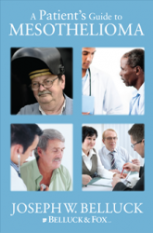
“Basket Study” May Open Doors for Clinical Trials for Mesothelioma Patients
 Memorial Sloan-Kettering Cancer Center (MSKCC) is breaking the mold with a new type of clinical trial, known as a “basket study.” Whereas traditional trials target a particular cancer, MSKCC is leading the way by offering clinical trials for anti-cancer drugs that focus on a specific biomarker or genetic mutation, regardless of the type of cancer. This “landmark” approach may open doors for more clinical trials being available to mesothelioma patients.
Memorial Sloan-Kettering Cancer Center (MSKCC) is breaking the mold with a new type of clinical trial, known as a “basket study.” Whereas traditional trials target a particular cancer, MSKCC is leading the way by offering clinical trials for anti-cancer drugs that focus on a specific biomarker or genetic mutation, regardless of the type of cancer. This “landmark” approach may open doors for more clinical trials being available to mesothelioma patients.
In the first published results of a basket study, MSKCC reports the results of a Phase II trial for the drug vemurafenib used to target the BRAF mutation in a variety of cancers. The drug has proven effective in melanoma patients with BRAF, so the researchers set out to determine whether it would be effective against other types of cancer with the BRAF mutation.
This approach to the trial is another step in personalized or targeted medicine that pairs the genetic makeup of a patient to a treatment. Personalized cancer treatment optimizes the potential for success and provides the patient with the assurance that he is not receiving a “cookie-cutter” approach to cancer care.
“Precision medicine has come to the forefront as the future of cancer treatment,” says Physician-in-Chief José Baselga, the study’s senior author, in the Aug. 20 MSKCC press release announcing the study. “This is the first example of what it looks like, and proof of how it works. This study demonstrates we can design trials based on genomics as opposed to site of origin of the cancer.”
The results showed the researchers that although the drug was effective against lung cancer and certain other rare cancers, it was not effective against all cancers with the BRAF mutation.
“You can’t simply extrapolate from the experience in one disease to all diseases,” said medical oncologist and co-author of the study, Dr. David Hyman. “You can’t assume a drug that works well blocking the BRAF protein in melanoma will by itself be just as effective in other cancer types with the same mutation.”
But, Dr. Hyman added, it may help guide researchers in finding treatments that will be effective when combined with the trial drug. Dr. Baselga adds that future basket trials will target combination therapies “because it is unlikely that targeting a single mutant protein will be effective.”
Breakthrough Approach for Rare Cancers
Perhaps the best news of this study, is that it has paved the way for mesothelioma patients, and patients with other rare cancers, to gain access to trials that might not otherwise be available to them.
According to Dr. Hyman, rare cancer patients are under-represented in trials due to cost constraints of pharmaceutical companies. The bottom line for basket studies is that patients with rare disorders can enroll as long as they have the mutation under study, said Hyman.
For many mesothelioma patients, their best chance at survival is participating in a clinical trial offering access to a drug that is not otherwise available. Finding new treatment options for mesothelioma is dependent on successful clinical trials offering novel approaches designed to combat the cancer.
MSKCC is the world’s oldest and largest private cancer center, and is one of the few centers in the U.S. with a team of specialists committed to providing the best possible treatments for patients with malignant pleural mesothelioma.
Mesothelioma, a rare form of cancer typically affecting the lining of the lungs, is highly aggressive and is resistant to many standard cancer treatments making it a difficult disease to treat effectively. Mesothelioma is an incurable cancer with the average survival time varying from 4 – 18 months after diagnosis. Ongoing research is critical to finding a cure or new treatment options for mesothelioma.
Nearly 3,000 Americans are diagnosed with mesothelioma each year.
The study was published in the Aug. 20 issue of the New England Journal of Medicine.
See ClinicalTrials.gov for more information on the Basket Study.

 Mike is a licensed attorney and the former editor of North Carolina Lawyers Weekly and South Carolina Lawyers Weekly. He has contributed numerous articles to the North Carolina State Bar Journal and is a co-author of Capital Lawyers, a history of the Wake County (NC) Bar.
Mike is a licensed attorney and the former editor of North Carolina Lawyers Weekly and South Carolina Lawyers Weekly. He has contributed numerous articles to the North Carolina State Bar Journal and is a co-author of Capital Lawyers, a history of the Wake County (NC) Bar.
 Gregory Froom is a licensed North Carolina attorney and the former editor of North Carolina Lawyers Weekly and South Carolina Lawyers Weekly.
Gregory Froom is a licensed North Carolina attorney and the former editor of North Carolina Lawyers Weekly and South Carolina Lawyers Weekly.
Leave a Reply